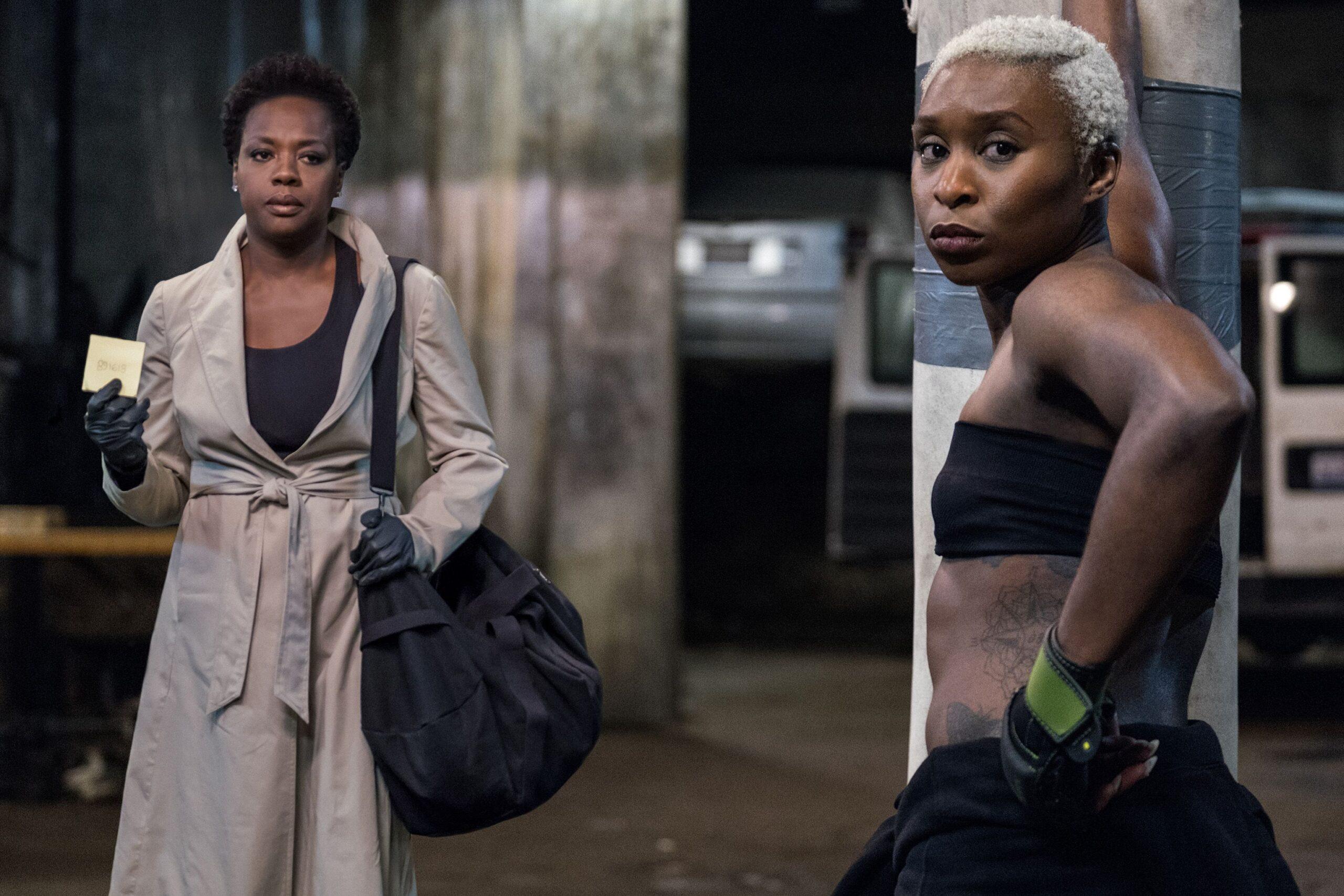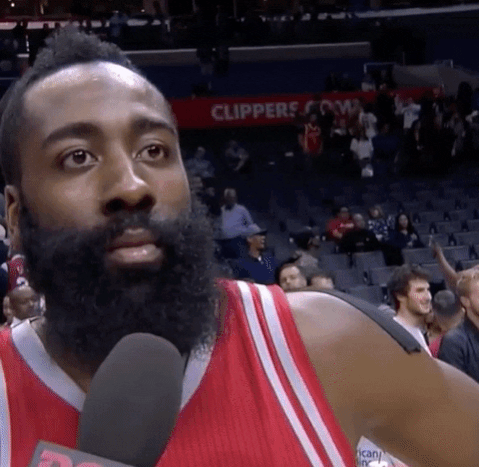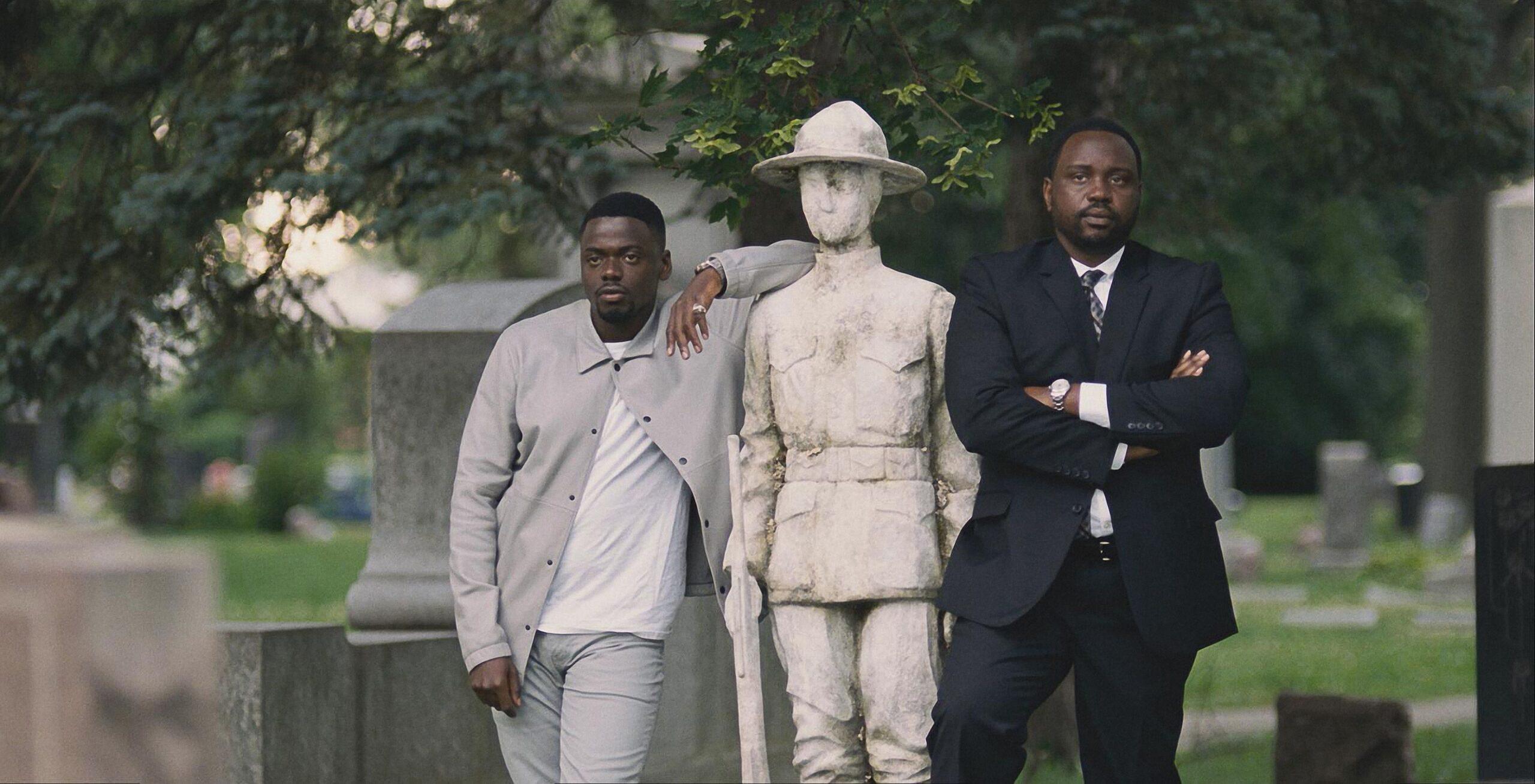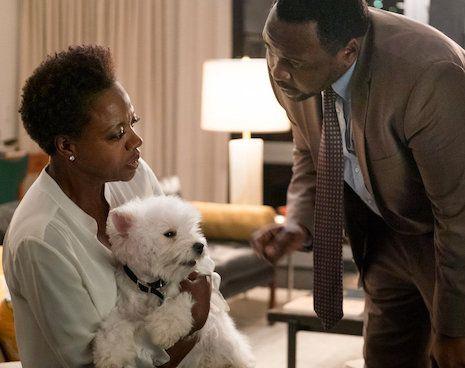
Steve McQueen’s Widows, which hit theaters this past weekend, is more than “a heist movie, but with women.” It is a movie about politics, marriage, and race. It is a movie about Chicago. It is a movie about a very good dog. After seeing Widows, the Ringer staff came together to talk about all of its diverging points and stories.
1. What is your tweet-length review of Widows?
Andrew Gruttadaro: The most instantly rewatchable movie of the last five years, at least.
Donnie Kwak: Energizing Hollywood juice, with extra pulp.
Sean Yoo: Ocean’s 8 on steroids. Viola Davis has an elite performance while being surrounded by an ensemble cast that holds its own and then some.
Alison Herman: You don’t have to “transcend” a genre. You don’t have to remake a movie that starred a bunch of dudes. You just have to round up an Oscar-winning director, a bunch of movie stars, and a smash-hit novelist, give them a mid-sized budget, and make a goddamn movie.
Kate Halliwell: Cynthia Erivo and Viola Davis could punch me in the face and I’d thank them.
Micah Peters: Because Steve McQueen—the guy who’s known for his painstaking dissection of human suffering—directed it, I cannot believe Widows is as fun as it is.
Bobby Wagner: You can go see Widows for its feats of filmmaking, or you can go see Widows for its copious shots of dogs and incredibly swole biceps. Either way works for me, as long as you go see Widows.
Miles Surrey: Viola Davis really just messed around, carried a West Highland white terrier for two hours, and got herself another Oscar nomination.
Michael Baumann: A thrilling, incredibly well-made film that lays out a lot of loose threads and pays all of them off. The New York Times is staffed by a bunch of weenies.
Amanda Dobbins: MOVIES ARE FREAKING GREAT.

2. What was the best moment of the film?
Halliwell: Elizabeth Debicki strutting out of the gun sale with three Glocks and a hot dog in hand was pretty iconic.
Herman: Debicki ripping into a hot dog after scamming a MAGA mom into buying her an arsenal’s worth of firearms is the GIF our generation of budding socialists deserves.
Dobbins: There are like three twists in this that I didn’t see coming, which is a testament to my total guilelessness as a moviegoer, and also to the enthralling nature of Widows. Anyway, I’m going with the climactic twist in the garage, if only because it lets Viola be Viola. Second place goes to the twist that is facilitated by the dog.
Peters: I’m calling it even between Every Scene Involving Daniel Kaluuya and the car chase at the end. Except it wasn’t really a car chase in the traditional sense, it was like if you reached into a car chase and grabbed it by the head rush and then pulled it inside out.
Gruttadaro: (1A) The oner shot from the hood of Jack Mulligan’s (Colin Farrell) car as he and his aide (Molly Kunz) drive from the projects of District 18 to Mulligan’s mansion, mere blocks away. Chicago and its politics, its income disparity, are subtly captured without a word while someone calls Colin Farrell a pussy—what’s not to love?
(1B) Everything Kaluuya did.
Surrey: When Jack Mulligan is driven back to his house from a campaign event, and we get a continuous take from the hood of the car. I can’t resist a good continuous take—but the moment also brilliantly distills the disassociation between Jack’s constituents in an impoverished neighborhood and his swanky mansion that’s only a few blocks away, just within the district limits. It’s what makes Widows work in miniature: rich political subtext with stylish packaging (and also a Golden State Warriors level of A-list talent).
Wagner: The one-take shot of the car driving from Jamal Manning’s (Brian Tyree Henry) campaign headquarters back to Mulligan’s house. I can’t even imagine being savvy enough to establish the political climate of Chicago gentrification in a three-minute shot.
Kwak: Any of the many times Davis’s character bosses her underlings around qualifies as a memorable moment, but two other scenes stand out: Kaluuya’s Jatemme Manning announcing himself as a cold-hearted henchman by mercilessly offing two rapping youngsters (shout-out to the Cool Kids!) and Farrell’s Jack Manning asking his female aide if she’s ever slept with a black man as they ride through inner-city Chicago.
Yoo: The long beatboxing tracking shot featuring the Cool Kids (!!!) and a terrifying Kaluuya. Between the rising tension and the beautiful Steadicam, that scene stands out to me as one of the best this year.
Baumann: I sort of zoned out when it was explained why those two guys were rapping in the locker room, but whatever the reason they had to die, the scene where Kaluuya shoots them was incredible. This movie had a ridiculously deep bench, but Kaluuya delivered my favorite performance, and this was the moment that established him as the physical embodiment of the menace and tension that hung over the rest of the movie.
3. What was your least favorite part of the movie?
Wagner: Brian Tyree Henry, please let go of that damn dog!!!
Peters: The fact that we never get to see Belle (Erivo) do much of anything with all that physicality, which is highlighted from the second she shows up. Also that there isn’t just … more Belle in general.
Herman:

Yoo: I didn’t enjoy the way Henry treated the dog.
Gruttadaro: The “name a library after my son” part at the end was just a tad too much.
Halliwell: I found it hard to care about the Mulligan family drama. More lady heisting, less men complaining.
Surrey: I get that there are a lot of mouths to feed in Widows, but giving us only 30 seconds of Jon Bernthal—as a shitty dude who wears tracksuits and has a motorbike in his living room—is a criminal offense.
Kwak: People grieve in different ways, so I don’t think the spontaneous makeout session between Linda and the husband of the deceased architect was at all unbelievable. It was just totally unnecessary.
Dobbins: Do I have to answer this? I don’t really have an answer for this. I even loved Farrell’s Irish-by-way-of-Boston Chicago accent.
Baumann: At the very beginning of the movie, Liam Neeson and Viola Davis have a really gross, really audibly wet open-mouth kiss, and it made me very unhappy. Kissing is bad now.
4. Who is Widows’ MVP?
Gruttadaro: An almost impossible question to answer, but I must, so with apologies to Kaluuya, who made turning up the volume on a TV seem terrifying, the answer is Davis. Viola really is that good as Veronica, lumbering around the movie while trying to keep her overwhelming rage and sadness and fear at bay. Veronica is not a leader — she’s barely even a good person — but she holds the movie together, and with Viola’s help, she’s why Widows feels revolutionary.
Wagner: No need to be a contrarian here—it’s Davis. For this movie to be what it is, you have to believe her character’s pain both in moments understated (like any number of times she coldly deadpans to another member of the widows crew) and deafening (like when she’s screaming at the top of her lungs in anguish).
Surrey: So many people in front of and behind the camera brought their A-game, but the fireworks begin and end with Davis. As if we needed more reminding, she’s pretty good!
Halliwell: It’s a tie between Debicki and Kaluuya for me—I’m just sad we didn’t really get them in a scene together so that he could stare threateningly at her belly button.
Kwak: Like a true MVP, Davis not only excels but also makes all of her teammates better, with Debicki being the prime beneficiary.
Peters: Davis finishes first in MVP balloting but Debicki was close behind in first-place votes.
Baumann: I don’t know if Davis’s performance was even one of my favorite five in the movie, but her gravitas is what holds this whole enterprise together.
Yoo: Davis is like LeBron James, because even though she’s well deserving of the award, she’s the easy vote. So give me Cynthia Erivo, who was outstanding in each minute of her limited screen time.
Dobbins: Erivo showed up halfway, and I did not take my eyes off of her for the rest of the movie. Again, second place goes to the dog here.
Herman: Erivo going toe to toe with Davis and coming out unscathed is like Vicky Krieps going toe to toe with Daniel Day-Lewis and stealing the movie, just with sports bras instead of mushrooms.

5. Who is Widows’ Sixth Man?
Peters: JATEMME. THE REC CENTER SCENE. THE BOWLING ALLEY SCENE. JATEMME.
Wagner: Michelle Rodriguez has all the attributes to be the sixth man of this movie—trying to decipher blueprints and ending up kissing a widower/total stranger is a Lou Williams “high-usage pull-up from 35” moment. But it would be misrepresentative to say any of the widows are coming off the bench, so give me Kaluuya. His performance was alarmingly physical. His eyes alone would have broken me.
Dobbins: KALUUYA! I was equal parts intrigued, charmed, and terrified by this performance.
Baumann: My man Lukas Haas, who you might know from Brick, as well as minor roles in Inception, the music video for “International Players Anthem,” and Leonardo DiCaprio’s sex life. Here he actually gets to talk and move the plot and shit. Good deal.
Gruttadaro: Farrell, who committed to that kinda-Chicago accent and always looked like he was very itchy.
Halliwell: Erivo was extremely clutch, between clapping back at Davis and just being unbelievably jacked.
Herman: Even the Wikipedia link did not help me fully understand this sports analogy, but good god, Kaluuya went from sympathetic hero to terrifying villain with a single mid-rap gunshot. I wish him the best, but I could not be paid to make eye contact with him.
Kwak: It’s a tie between Kaluuya and Haas—the former for being effortlessly (and thus believably) sinister as Jamal Manning’s brother-slash-muscle and the latter for being effortlessly (and thus believably) slimy as Alice’s would-be sugar-daddy savior. Contemptible characters both, but appealing nonetheless.
Yoo: RIP, Bash. … My dude didn’t deserve to go out like that.
Surrey: A three-way tie between Erivo’s jacked arms, Kaluuya’s fiendish grins, and Carrie Coon’s aura.
6. Can you ever trust Liam Neeson again?
Dobbins: God, I loved this. As soon as that dog trotted to the door, I felt like a total idiot—of course Liam Neeson would not take a flashback-only role. But I didn’t see it coming, which is the highest compliment in this context.
Peters: Absolutely not. The snake. It really do be your own people.
Halliwell: I can take him or leave him, but Carrie Coon is the love of my life, and I resent this movie for making me doubt her!
Yoo: I’ll trust him only if he’s trying to save my daughter, fight back against a pack of bloodthirsty wolves, or commuting to work.
Wagner: I’m not sure I ever trusted Neeson in the first place. None of the trustworthy people I know in my normal, everyday life are just running around with special sets of skills.
Herman: As a husband? No. As the first person to call when my child is kidnapped and/or there’s a murderer on my Metro-North? He’s still on speed dial.
Baumann: I mean, he built up a lot of trust points in Schindler’s List, and I don’t think he spent all of them here.
Surrey: Neeson might’ve burned us here, but he’s also about to play a snowplow driver named Nels Coxman (!) who exacts icy revenge on a drug cartel in a movie that was almost titled Hard Powder (it’s Cold Pursuit now). I still trust the guy with my life.
Gruttadaro: I will, against my best judgment. And then he will leave me for Coon and I’ll have no one to blame but myself.
7. Widows is a movie full of ideas and subplots—which one are you still thinking about?
Peters: I’m still thinking about how Marcus died, and the ways in which Veronica and Harry dealt with it or didn’t deal with it.
Gruttadaro: Tom Mulligan’s downright tribalistic outlook on American politics—delivered with perfect Old Man Yelling at Sky invective by Robert Duvall—and the assumption that that exact philosophy is being communicated in several important rooms right this second.
Kwak: I kept getting Logan Roy vibes from Duvall as Jack Mulligan’s hardass father, so now I wonder what Farrell could’ve done as Kendall Roy.
Yoo: Coon and Neeson’s affair could’ve gotten some extra scenes of explanation.
Surrey: The widows’ reclamation of what their husbands robbed from them. And the fact that it meant they got to do some actual robbing themselves.
Dobbins: Besides the idea that you can’t trust a man or a government (of men)? I agree with Alison Herman’s excellent piece—it was invigorating to watch a movie starring women that didn’t trip over itself to be an IMPORTANT MOVIE ABOUT WOMEN, PLEASE GIVE US YOUR MONEY. Much easier to get my money when you make Widows.
Baumann: In the theater, I was sucked in by how good a heist movie Widows was, but the further I get from the theater the more I’m struck by how much this movie had to say from a political perspective. Even though it paid off in the end, the election subplot itself sometimes felt like the one superfluous thread, but every moment of Widows was saturated with commentary on race, gender, gun ownership, machine politics, the interactions between economic classes, and the intersections of all of those issues.
Herman: Widows should feel overstuffed, but doesn’t—there’s a remarkable economy to how it communicates the vagaries of Veronica and Harry’s marriage, or Alice’s history of trauma. That single shot of a politician’s SUV traveling from the ward he wants to govern to the well-heeled mansion where he lives is just about all the explicit political or class commentary this movie needs to make. It’s indelible.
Halliwell: I’ve probably talked to 10 people about that tracking shot through Chicago, and we all can’t get over it.
8. Who did the best Chicago accent?
Herman: I’m pretty sure one of Debicki’s 462,252 accents was from Chicago, so … that one.
Surrey: Duvall, on the basis that he’s the only actor who seemed to actually try. (Colin Farrell had a few slips of Irish in his Irish American.)
Baumann: I don’t have a great ear for a Chicago accent … Debicki, I guess?
Yoo: Farrell—I don’t even know if it was a good accent, he just sounded funny.
Gruttadaro: I mean, Farrell has the most noticeable accent, but also shout-out to Coon for importing her Midwest accent from Season 3 of Fargo.
Wagner: The only times I even noticed a Chicago accent were the few times when Farrell stopped being a Goodfella. I don’t know, maybe I’m just so used to the purity of the Chicago accent from the hundreds of times I’ve watched Home Alone.
Kwak: Can’t say I’m an expert on that specific dialect but I’ll give it to Farrell, since he basically sounded like a cartoon bad guy.
Dobbins: Stop making fun of Colin Farrell.
9. Pick an Oscars Season dog: Olivia from Widows or Charlie from A Star Is Born. (And no, you cannot pick both.)

Gruttadaro: Sorry, Charlie, but while you did get to eat a very emotional steak, Olivia actually unlocked the plot of a movie.
Wagner: I’m breaking one of my personal codes by saying that any one dog deserves anything more than another dog, but I think Olivia. Stunning performance all around. Exquisite screen presence.
Yoo: I think Olivia was the better actor, but Charlie’s level of fluffiness is going to give him the edge for me.
Peters: Olivia nearly cracked a cold case wide open; all Charlie did was eat a steak.
Baumann: Charlie. Charlie was presented with a gigantic steak and didn’t eat it until he was invited. Then he went out by the garage and delivered one of the biggest emotional punches of the movie. All Olivia did was make you worried you’d have to watch a dog get its neck broken.
Herman: Charlie is a good boy and all, but only Olivia wises her owner up to an earth-shattering betrayal in time for her to draft a contingency plan. Cute and practical!
Surrey: Charlie, because he’s the main reason I cried during A Star Is Born (THE STEAK!!!), and because big dogs are almost always better than small dogs. Olivia is wonderful and I also enjoyed her performance in Game Night, but if you’re going for a dog that’s marginally bigger than a burrito, you might as well get a cat.
Halliwell: Olivia, hands down. Charlie was there just for emotional manipulation—Olivia was vital to the plot!
Dobbins: I think we’ve already established this, but: The RANGE that the Widows dog has; the POWER AND RESPONSIBILITY that she has. I am very sorry for Charlie from A Star Is Born and I hope Ally takes good care of him, but … it’s the Widows dog.
Kwak: How about … neither? When can we get an Oscars Season cat?
10. If there were a Widows sequel, what would you want it to be about?
Gruttadaro: I’m not totally sure, but I know that it would feature a lot more Brian Tyree Henry.
Halliwell: Does Cynthia Erivo’s workout routine count?
Baumann: I’d take a straight-up The Candidate– or Primary Colors–style movie about the Mulligan-Manning rematch.
Yoo: A movie about two best friends starring Viola Davis’s Veronica and Elizabeth Debicki’s Alice.
Kwak: Having lost the election to Jack, Jamal Manning returns to the underworld and teams up with Veronica and Alice as part of a new crew whose aim is to combat political corruption in Chicago by robbing the coffers of its most crooked players.
Wagner: A partner-in-crime spinoff with Davis and Debicki. Their relationship was given the most direct storytelling time between any of the four widows, but I think it still has room to go elsewhere.
Herman: There should not be a Widows sequel, but there should be a spinoff about Debicki scamming her way to upper-middle-class respectability. Who was she having lunch with in that diner?!
Surrey: Our quintet of women team up for another big score, as Widows becomes the all-female heist franchise Ocean’s 8 should’ve been. The Ocean’s 8 cast is all invited into the Widows-verse, too.
Peters: I actually want a prequel, either entirely about the Rawlingses or the Mannings. I actually don’t care which. Actually both. One and then the other.
